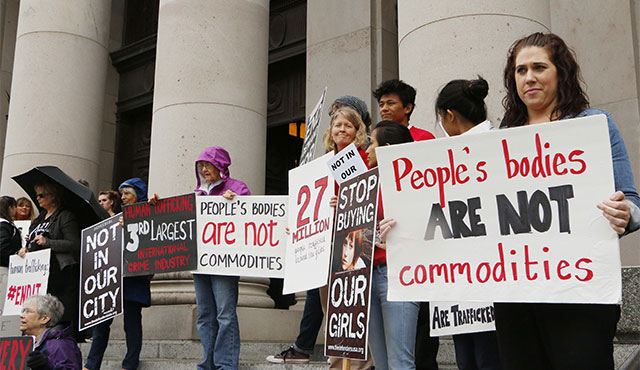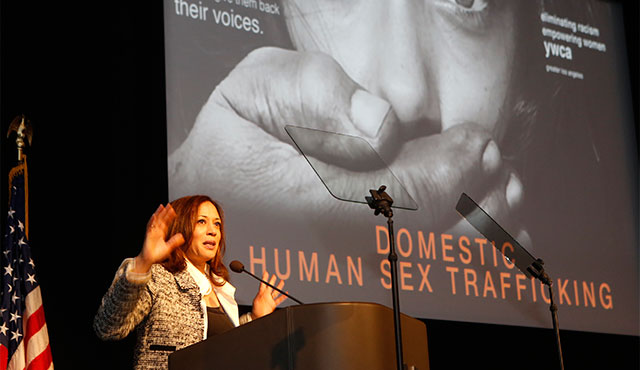Anticipating the first International Day of Prayer and Awareness Against Human Trafficking on Feb. 8, Pope Francis denounced modern slavery in stark and forceful language in his Jan. 1 message for the 48th World Day of Peace.
Calling for concrete action to combat what he called the “scourge” of worldwide human trafficking, the pontiff said that “whenever sin corrupts the human heart and distances us from our Creator and our neighbors, the latter are no longer regarded as beings of equal dignity, as brothers or sisters sharing a common humanity, but rather as objects.”
He appealed to “all men and women of good will” and to “the highest levels of civil institutions” to combat human trafficking and “not to become accomplices to this evil, not to turn away from the sufferings of our brothers and sisters , our fellow human beings, who are deprived of their freedom and dignity.”
The Mass for the World Day of Peace was celebrated in St. Peter’s Basilica. The theme for day was “No Longer Slaves, but Brothers and Sisters.”
An estimated 35.8 million people suffer in slavery worldwide, according to the second global slavery index published in November by the Walk Free Foundation, a human rights group based in Australia. Modern slavery is defined as the systematic deprivation of a person’s liberty, and abuse of their body for personal or commercial exploitation. It includes forced labor, debt bondage, trafficking in persons, organ trafficking, sexual exploitation for money, and forced marriage.
For traffickers and pimps, slavery is one of the most lucrative illegal activities in the world. One estimate sets the total yearly profit of the phenomenon at $32 billion, making slavery the third most profitable “business” after drugs and arms trafficking.
“All of us care called by God to be free, all are called to be sons and daughters, and each, according to his or her own responsibilities, is called to combat modern forms of enslavement,” said the pope in his address. “From every people, culture and religion, let us join our forces.”
Francis’ call for global solidarity and action came slightly more than a month in advance of the International Day of Prayer and Awareness Against Human Trafficking, designated by the Pontifical Council for Justice and Peace and the International Union of Superiors General. The Feb. 8 observance coincides with the feast day of Saint Josephine Bakhita, who was kidnapped as a child and sold into slavery in Sudan and Italy. When she was eventually freed, she became a Canossian nun and dedicated her life to sharing her story of deliverance from slavery and comforting the poor and suffering. She was canonized in 2000.
On her feast day, Catholics throughout the world will be encouraged to host or attend prayer services to create greater awareness about modern slavery and human trafficking. “If just one person realizes from this day that they or someone they know is being trafficked,” said Bishop Eusebio Elizondo, M.Sp.S., the U.S. Bishops’ committee chairman for migration, “we will have made a difference.”
RESOLVE TO FIGHT HUMAN TRAFFICKING
- Learn about trafficking
Visit the anti-trafficking pages from CCUSA, USCCB, the Global Freedom Network, Caritas, and Talitha Kum to learn what Catholics are doing to combat modern day slavery.
- Talk about trafficking
Follow members of the Catholic Coalition Against Human Trafficking to get updates on the work we are doing. Use social media to spread awareness about the issue of trafficking by tagging your posts with #HumanTrafficking and #SlavesNoMore.
- Catholic Charities USA (@CCharitiesUSA @EndPoverty | Facebook)
- US Conference of Catholic Bishops, Migration and Refugee Services (@MRSserves @USCCB |Facebook)
- Become a Responsible Consumer
Visit slaveryfootprint.com to find out how you may be unknowingly supporting slave labor. Learn what you can do about it by visiting CRSFairtrade.org
- Volunteer
Volunteer at your local Catholic Charities agency to help serve victims of trafficking as they seek restoration for their lives. Contact your local Catholic Charities agency to find out about their work.
- Become a SHEPHERD
Become a leader on trafficking in your community by hosting a workshop with your parish or other community group. Visit the USCCB’s Become a SHEPHERD page to download the toolkit to educate your community about human trafficking.
- Advocate
Engage your elected officials. Ask what they are doing to combat trafficking and press them to take action against this issue in your community and across the nation. Use CCUSA’s trafficking action page or USCCB’s migration policy page to learn more about current legislative issues and take action. Act globally on the “root causes” of trafficking through Catholics Confront Global Poverty, a joint initiative of the USCCB and CRS.
- Pray
Observe the National Day of Prayer for Victims and Survivors of Human Trafficking on February 8th, the feast day of St. Josephine Bakhita. Attend a special Mass in Washington, DC or host your own Mass or Prayer Vigil. Share this St. Josephine Bakhita prayer card.
- Report trafficking
Report any suspected trafficking, exploitation, or suspicious activity to the National Human Trafficking Hotline at 1-888-3737-888 or text HELP or INFO to BeFree (233733). Add these numbers to your cell phone!
If a victim is in urgent need of assistance, please contact law enforcement immediately.


